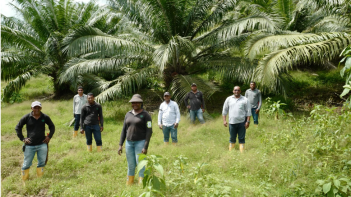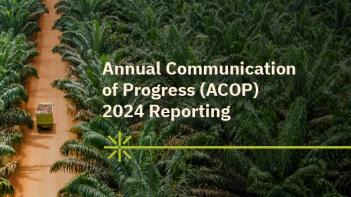A Joint Steering Group will develop a framework to implement the RSPO’s updated certification standards for No Deforestation in High Forest Cover Landscapes
Kota Kinabalu, Sabah – The Roundtable on Sustainable Palm Oil (RSPO) and the High Carbon Stock Approach (HCSA) have agreed to establish a No Deforestation Joint Steering Group (NDJSG) focused on providing guidance on the implementation of no deforestation requirements in High Forest Cover Landscapes. This collaboration is to support the incorporation of No Deforestation and the HCS Approach into its revised certification standard that was adopted at the RSPO 15th annual General Assembly held on Thursday, 15 November in Kota Kinabalu, Malaysia.
The approach to High Forest Cover Countries and Landscapes in some of the world’s last remaining tropical rainforests has been a key area for discussion over the course of the RSPO Principles and Criteria (P&C) review process, in the last 18 months. The Joint Steering Group will consider the palm oil sector’s transition to local community production that conserves and enhances ecosystems in High Forest Cover Landscapes, while achieving sustainable livelihoods and poverty reduction. It will also socialise plans to balance these objectives and ensure practices that respect land users’ rights and uphold indigenous peoples’ rights to self-determination.
Judy Rodrigues, Executive Director of the High Carbon Stock Approach welcomed the agreement and said, “We are committed to working with the RSPO to develop guidance to implement no deforestation in High Forest Cover Countries and Landscapes. It is our hope that working together with Indigenous Peoples and local communities who will be supported and able to engage fully with this process we can find lasting solutions to the growing loss of rainforests in these regions.”
Datuk Darrel Webber, RSPO Chief Executive Officer, highlighted the importance of the partnership with HCSA, stating, “This collaboration provides the platform to provide lasting solutions to halting deforestation, through engagement and alignment on the approach. Most importantly, it will allow local stakeholders (particularly communities) to make their own participatory decisions on land use, in achieving positive impacts balancing sustainable livelihoods, and poverty reduction, with the need to conserve, protect and enhance ecosystems and respect land users’ rights,” he said.
About RSPO
The Roundtable on Sustainable Palm Oil (RSPO) was formed in 2004 with the objective of promoting the growth and use of sustainable oil palm products through credible global standards and engagement of stakeholders. RSPO is a not-for-profit association that unites stakeholders from the seven sectors of the palm oil industry including oil palm producers, palm oil processors or traders, consumer goods manufacturers, retailers, banks and investors, environmental or nature conservation NGOs, and social or developmental NGOs.
This multi-stakeholder representation is mirrored in the governance structure of RSPO, such that seats in the Board of Governors, Steering Committees and Working Groups are fairly allocated to each sector. In this way, RSPO lives out the philosophy of the "roundtable" by giving equal rights to each stakeholder group, facilitating traditionally adversarial stakeholders in working together to reach decisions by consensus, and achieving RSPO’s shared vision of making sustainable palm oil the norm.
The seat of the association is in Zurich, Switzerland, while the secretariat is currently based in Kuala Lumpur with satellite offices in Jakarta (ID), London (UK), Zoetermeer (NL), Beijing (CN) and Bogotá (CO).
About the HCS Approach
The HCS Approach is the first practical, field-tested methodology for distinguishing forest areas that should be protected or restored, from degraded lands that may be developed, using an integrated land-use planning approach. The methodology was developed with the aim to ensure a practical, transparent, robust, and scientifically credible approach that is widely accepted to implement commitments to halt deforestation in the tropics, while ensuring the rights and livelihoods of local peoples are respected. The HCS Approach has allowed major plantations and supply chain actors to reduce their impact by not clearing or purchasing goods from HCS forests and High Conservation Value (HCV) areas. For further information, please visit www.highcarbonstock.org.
Keep reading

Call for Expression of Interest: Independent Investigation of a Complaint

Latin American Smallholders, Key Global Brands Gather in Peruvian Amazon to Advance Sustainable Palm Oil

RSPO Forum for Members and Certification Bodies 2025: Strengthening Capacities and Building Bridges with RSPO Members

From Violence to Prosperity: Cultivating Sustainable Palm Oil in San Pablo, Colombia

Palmas de Tumaco: Enduring, Trusting, and Transforming in Colombia’s Pacific Coast
Carry Over Credits for Certified Independent Smallholder Groups

From the Amazon to the Aisles: Discovering Sustainable Palm Oil in the Heart of Peru

Global Trends of Sustainable Palm Oil and China's Pathway




